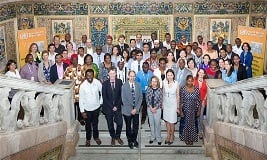Third Advanced Course on Health Financing for Universal Coverage for Low- and Middle-Income Countries
13-17 June 2016, Barcelona, Spain

Overview
"It’s been a rewarding experience to be here. Quite a lot to take home. It became clear that while we focus on revenues, we should not forget pooling and strategic purchasing, a lot can be done using policy instruments there."
The third WHO Advanced Course on Health Financing for Universal Coverage for Low- and Middle-Income Countries took place in Barcelona, Spain from 13-17 June 2016. Participants came together for this one-week-long training course to discuss how health financing policy can be used to improve health system performance in support of universal health coverage.
The course focused specifically on the context of low- and middle-income countries and complements the Barcelona Course on Health Financing which focuses on the WHO European Region.
Robert Ramos
"All the lecturers emphasised the importance of having an appropriate diagnostic of the financing system and to avoid being supply driven. It was a privilege to participate in this training with health financing professionals from so many different countries."
Tomomi Ito
Representative, health and education
JICA Bangladesh office
"Working on a case study was a good way to understand our own system. When we started the exercise we thought we knew everything, but then…we realized then that we jumped to solutions before identifying the real causes of the problems we see in our health system. The case study forces you to think logically and as you think logically, then your solution may not be the best solution and there are other options that you may now begin to consider once you go back to the main problem."
Participants on the course were selected to ensure representation from a diverse set of stakeholders including: senior policy makers from Ministries of Health, Ministries of Finance, government health insurance organisations, bilateral and multilateral development organisations, and civil society representatives. During the course, participants used a framework to analyse and reflect on their own health systems performance, assess the problems it faces, and discuss ideas with professionals from a wide range of countries.
Reaching households outside the formal sector was an important theme, which built around the following core topics:
- Raising revenues – opportunities and constraints
- Pooling health revenues – the cost of fragmentation
- Purchasing – more health for the money through payment reforms
- Designing a benefit package – equity, affordability and transparency
- Health financing and public finance management – enabling implementation
- Coordinating reform – aligning policy instruments with policy objectives
The Health Financing Policy team, part of the Department of Health Systems Governance and Financing at WHO, Geneva designed and delivered the course.
Keynote speakers were:
- Adam Wagstaff from the World Bank;
- Sarah Bennett from Johns Hopkins; and
- Eduardo Gonzalez-Pier, former Deputy Minister of Health, Mexico.
Contact
For further questions about the course please visit the general course information or email: hfcourse@who.int.
Keynote presentations
Adam Wagstaff
Sarah Bennett
Eduardo Gonzalez Pier
Q&A session
Advanced Course on Health Financing for Universal Coverage for Low- and Middle-Income Countries
Previous courses:
- Second course, Barcelona, Spain (8 to 12 June, 2015)
- First course, Tunis, Tunisia (16 to 20 June, 2014)
Contact
For further questions about the course please visit the general course information or email: hfcourse@who.int.

